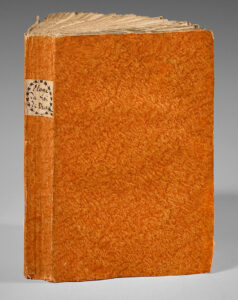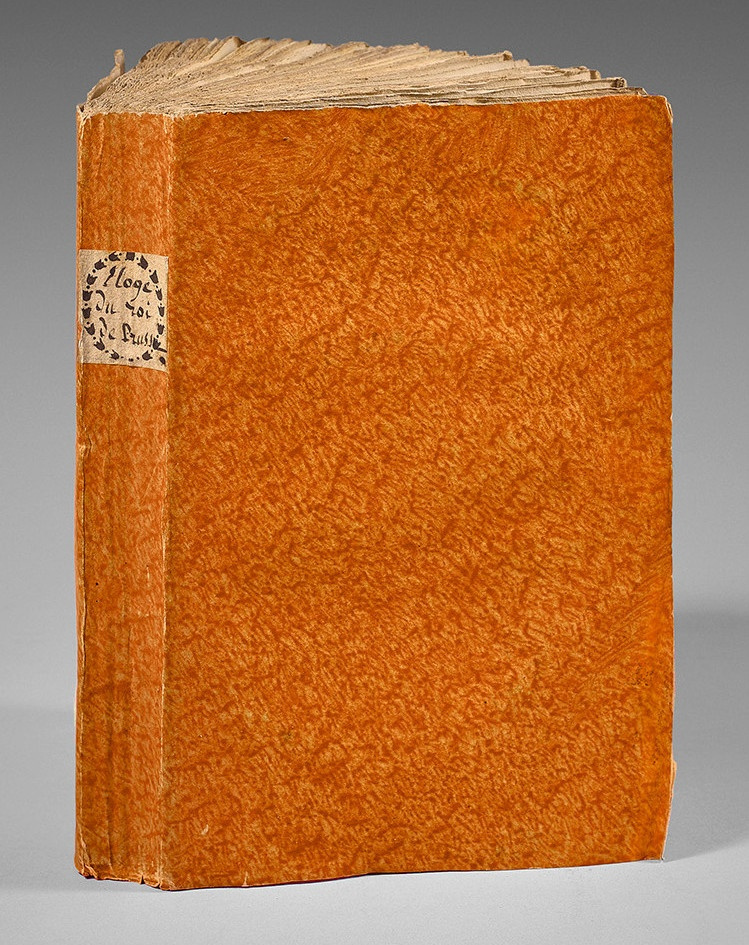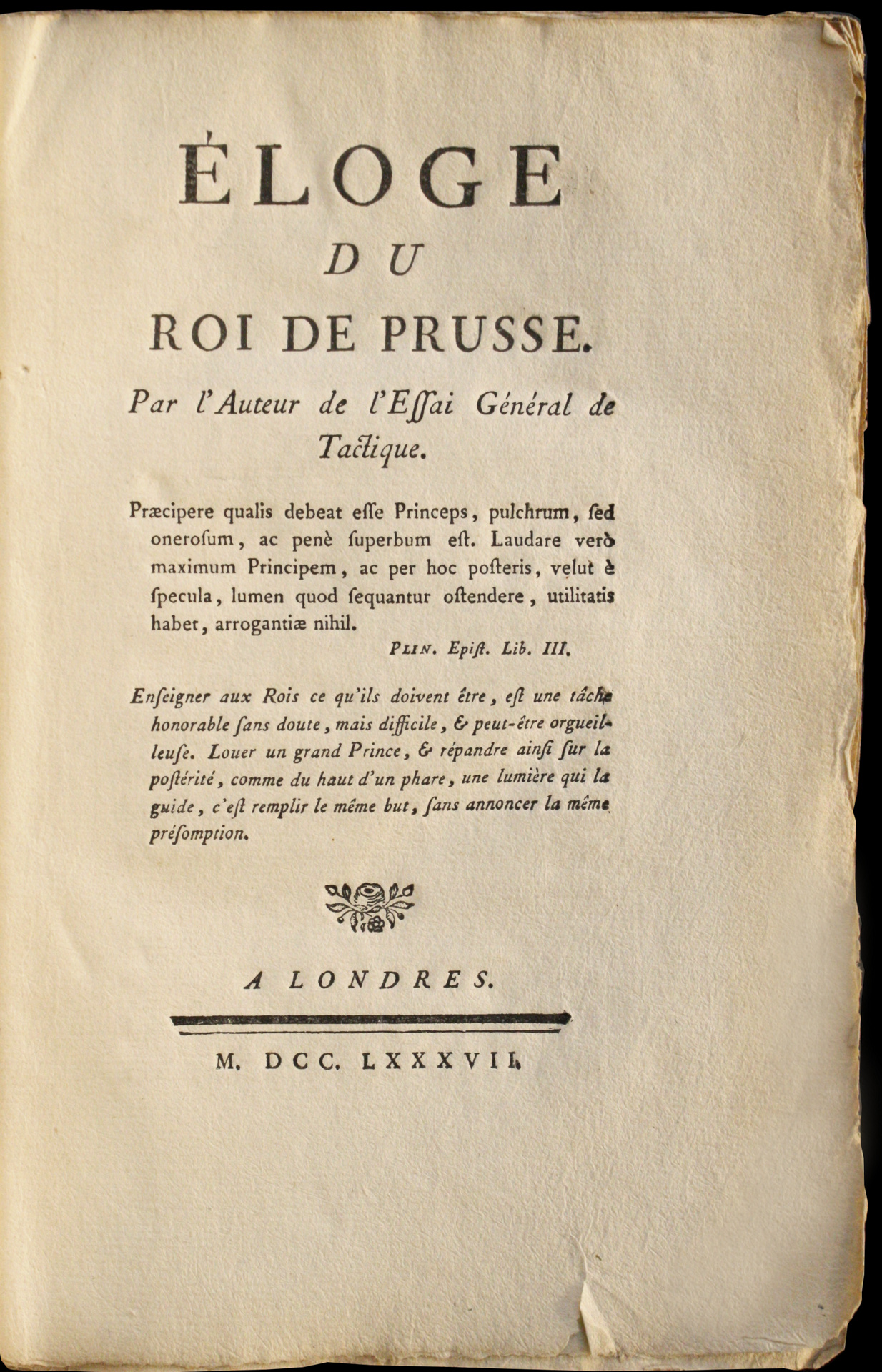London, 1787.
8vo [212 x 137 mm] of 304 pp. Preserved in its original orange wrappers, paper lettering-piece at the head of the spine, untrimmed. Original wrappers.
Rare first edition of this analysis of the campaigns of Frederick II evaluated by the famous French tactician Jacques-Antoine-Hippolyte Guibert, a work that had a great influence on the military conceptions of Napoleon.
Jacques-Antoine-Hippolyte Guibert is a French general and military author born November 12, 1743 in Montauban and died May 6, 1790 in Paris.
« His stay in Berlin, Postdam and Silesia, his conversations with Frederick, and the quite intimate relationship he had with Mr de Catt, the abbot Bastiani, Colonel Quintus Icilius, the generals of Anhalt and Rossieres, and with many other characters very much able of informing him about the history of Prussia and Frederick’s nature, gave him the idea and provided him with the means to write ‘l’Eloge du roi de Prusse’. In London (Paris), 1787, 304 pages 8vo. This work has often been reprinted; it has been translated, twice into German, and into Italian. We find a severe critique of the latter in the ‘Lettre du comte de Mirabeau à M. le comte de… sur l’Eloge de Frédéric, par M. de Guibert’, 1788.
De Guibert is often mentioned in the correspondence of Frederick.” (Works of Frederick the Great).
Guibert entered in 1756, at the age of thirteen, to the Auvergne regiment with the rank of Lieutenant. He became Captain in 1758 and took part in the Seven Years’ War. He accompanied his father, Charles-Benoît, Count of Guibert (1715-1786), camp Commander of Marshal de Broglie. His father, of modest extraction and officer of fortune, had reached the rank of Lieutenant general and the functions of Governor of the Invalids in 1786.
He was decorated with the Cross of Saint Louis during the operations in Corsica. At the end of the campaign, he is appointed Colonel and receives the command of the Corsican Legion at its creation. He published in Liège his Essai général de tactique, accompanied by a Discours in which he offers “…to trace the political and military picture of Europe” and especially of his Nation by considering “its constitution, its means, its engineering, the situation of its army… I will dare to speak about its administration, to reveal its abuses, to seek remedies, to finally raise the edifice of a constitution, both political and military”… As a precaution, he retired in Prussia waiting to see the effect his work would have on public opinion: thus in 1773, Frederick II The Great recognized in him a great tactician with whom he would often converse on military questions.
His Défense du système de guerre moderne, a response to criticism, shed light on the methods of reasoned and scientific defense used by the Prussian army. This was the basis of his work when he cooperated in 1775 with the Count of Saint-Germain in a series of reforms of the French army, including the regulation of exercise and maneuver of 1776.
He was elected to the French Academy on December 15, 1785, and received by the Marquis de Saint-Lambert on February 13, 1786. On the eve of the Revolution, he was recalled to the War Administration Council in 1787 of which he became the kingpin. In 1788, he was appointed camp Marshall and divisional infantry Inspector of Artois; but he was in turn suffering from attacks: the reforms he introduced made him unpopular. He was swept away by a short illness on May 6, 1790.
Guibert’s work has had a great influence on the military conceptions of Napoleon, who had read and reflected on his writings.
“Traditionally, Napoleon is presented as the direct heir of Guibert and his theories.
In 1977, Jean Tulard did not emit a different opinion from that of Soboul in his famous Napoléon ou le mythe du Sauveur: “The strategic ideas of Napoleon were not new; they came straight from Guibert and the divisional principle.” In the very good work of popularization of Thierry Lentz, Napoléon: « Mon ambition était grande », published in 1998, on page 71, on the front page of Chapter IV entitled “Le Dieu de la Guerre (1800-1810)”, we are given a photograph of the Emperor’s campaign kit, enhanced by a photographic montage with two books wide open. On the right page of the book with the smallest dimensions, we can read this title: Essai général de tactique. This nice montage is in perfect harmony with what Thierry Lentz writes on page 86, saying that ‘young, he had discovered the basis of his strategy in Guibert’s comments on the campaigns of Frederick the Great’.”
Beautiful copy preserved untrimmed in its original wrappers.


